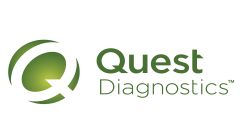Blood test for early detection of Alzheimer's Disease (AD) risk will lead to better patient care, physicians say; US. adults call for earlier evaluation and more education

Quest Diagnostics released a new research report, The Coming Alzheimer's Disease Healthcare Revolution: U.S. Physician and Adult Perspectives on the Future of Diagnostics and Treatment, that provides insights into the expectations and hopes of primary care physicians and American adults for the current and future landscape of dementia and AD testing, treatment and care. According to the report, a majority of physicians (66%) believe we are on the precipice of groundbreaking new treatment options for AD.
While 50% of physicians do not think there will ever be a cure for AD, the surveys indicate that physicians and American adults are optimistic that a new generation of therapies and diagnostics for the disease will improve patient care. In fact, more than 3 in 4 physicians (77%) believe new therapies will transform AD into a chronic, manageable disease–and 84% say testing for early risk of the disease will lead to earlier and improved disease management. Among U.S. adults, 9 in 10 (90%) say they are hopeful that new therapies will cure AD, and 86% believe blood tests for the early detection of AD risk will increasingly become a regular part of preventative care.
Based on insights from online surveys of 501 primary care providers (PCPs) and 2,052 Americans aged 18 years and older, the report also highlights the important role diagnostics may play in the next era of AD healthcare. Quest Diagnostics commissioned The Harris Poll to conduct the surveys in March 2022.
The report suggests cost concerns could impede the adoption of blood tests for AD: more than 8 in 10 physicians (85%) say the value of a blood test for the early detection of AD risk will depend on how widely it is reimbursed. However, 94% of physicians say blood tests would be more cost-effective for the healthcare system compared to more invasive methods of detection (e.g., lumbar puncture, imaging studies).
"We are on the cusp of a new generation of therapies for Alzheimer's disease, but the important role of diagnostics has been missing from the conversation. Patients today are typically screened for Alzheimer's disease only after signs of cognitive impairment emerge and often by expensive methods, such as brain imaging and cerebrospinal fluid taps, which only specialists can perform. As new, efficacious therapies come to the forefront, the need for scalable, less invasive and more cost-effective diagnostics, including in primary care settings, will grow," said Michael K. Racke, M.D., Neurology Medical Director, Quest Diagnostics. "Our goal for this report is to help prepare the medical community and engaged patients and caregivers for the transformational healthcare shifts that must occur to unleash the full potential of future treatment and diagnostic innovations to improve outcomes for patients with Alzheimer's disease."
The new Quest report follows the Centers for Medicare and Medicaid Services' decision in April to limit coverage of the AD drug aducanumab to patients who receive it as participants in a clinical trial. The Food and Drug Administration's approval of the drug in June 2021 marked the first authorization of a treatment designed to target AD pathophysiology. In addition, the identification of biomarkers for AD has led to new avenues of pharmaceutical drug research and development. More than 100 disease-modifying therapies are now in clinical trials–nearly 20 in phase 3.i
To prepare for the treatments of the future, American adults call for earlier evaluation, want more education; physicians foresee surge in demand
U.S. adults want to be evaluated for dementia, including AD, earlier than current medical practice. While physicians say they begin evaluating patients for AD at about age 66 (mean), adults want to be evaluated for dementia, including AD, at about age 57 (mean)—a difference of nearly 10 years. And while 86% of adults have some fear about receiving an AD diagnosis, nearly the same proportion (83%) would agree to take a blood test for early detection of AD risk if their results might help researchers develop better treatments for the disease. More than 8 in 10 adults (83%) agree that they want more education about when they should be proactively evaluated for signs of AD and other forms of dementia.
Quest Diagnostics is introducing the QUEST AD-Detect Amyloid Beta 42/40 Ratio, a new analytically validated blood test that aids in assessing the risk of AD. The laboratory-developed test is designed to be used by a healthcare provider to help assess the risk of AD in a patient. It evaluates the ratio of two peptides of amyloid beta, Aβ42 and Aβ40, in plasma sourced from a single blood test and is designed to monitor Aβ42/40 changes over time to assess the risk potential of AD progression. QUEST AD-Detect is a high-precision assay of a type shown in a recently published study to be as effective as traditional methods.
With a physician's order, patients may supply a blood specimen at a Quest Diagnostics patient service center for testing with QUEST AD-Detect Quest Diagnostics operates a national network of more than 2,100 patient service centers, for convenient patient access. In addition to providing accessible insights into the risk of AD, QUEST AD-Detect blood-based biomarker testing may also help identify patients who are candidates for early antibody treatment.
"As scientists work to develop treatments for Alzheimer's disease, Quest Diagnostics is also developing laboratory innovations, such as AD-Detect, that have the potential to help physicians more reliably identify patients at risk for the disease, even before symptoms manifest, as well as monitor progression," said Chris Scotto DiVetta, Vice President and General Manager of Neurology and Pharma Services, Quest Diagnostics. "AD-Detect may also help biopharmaceutical companies seeking better methods of screening patients for participation in trials for AD therapies."

Subscribe To Our Newsletter & Stay Updated